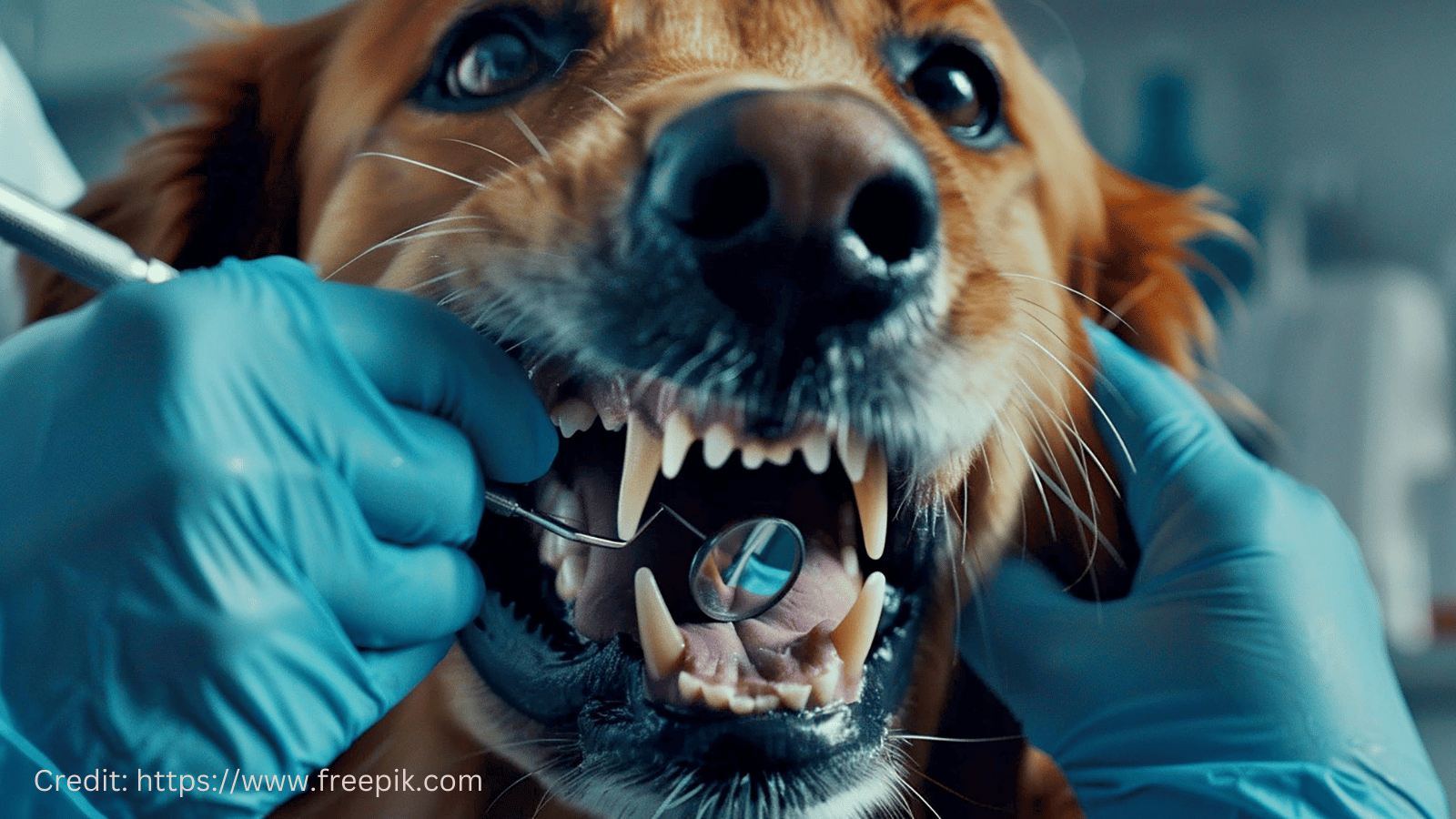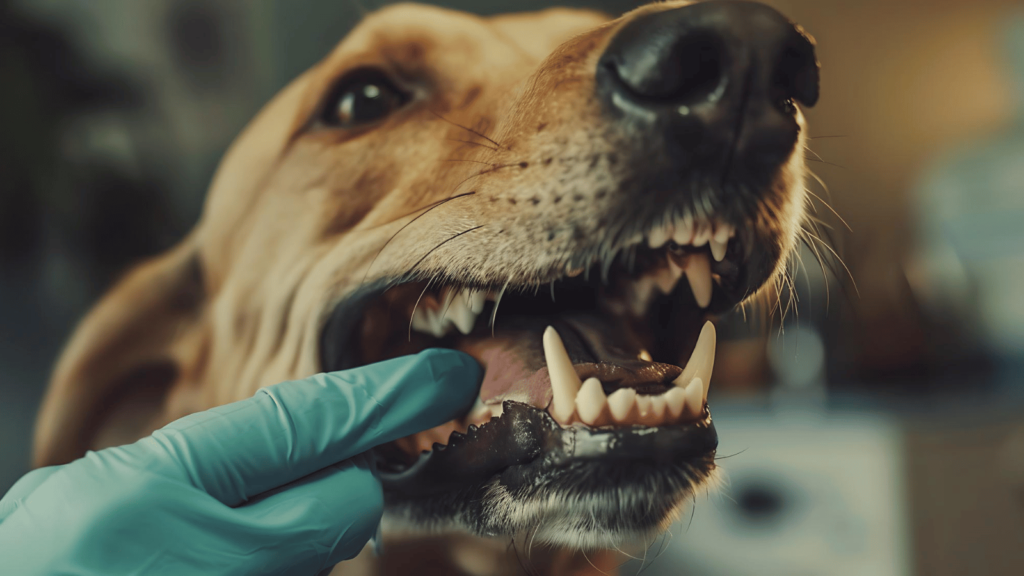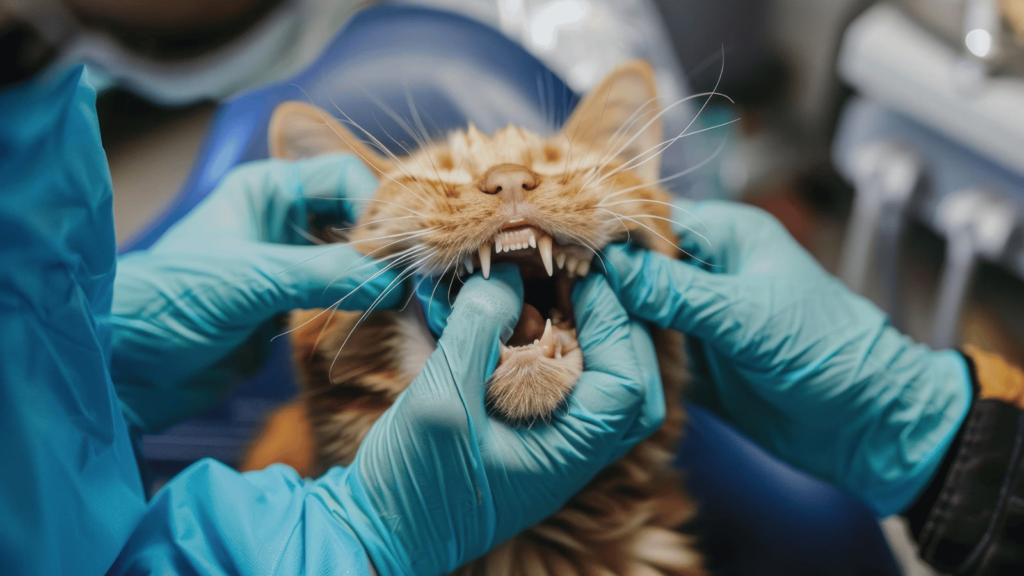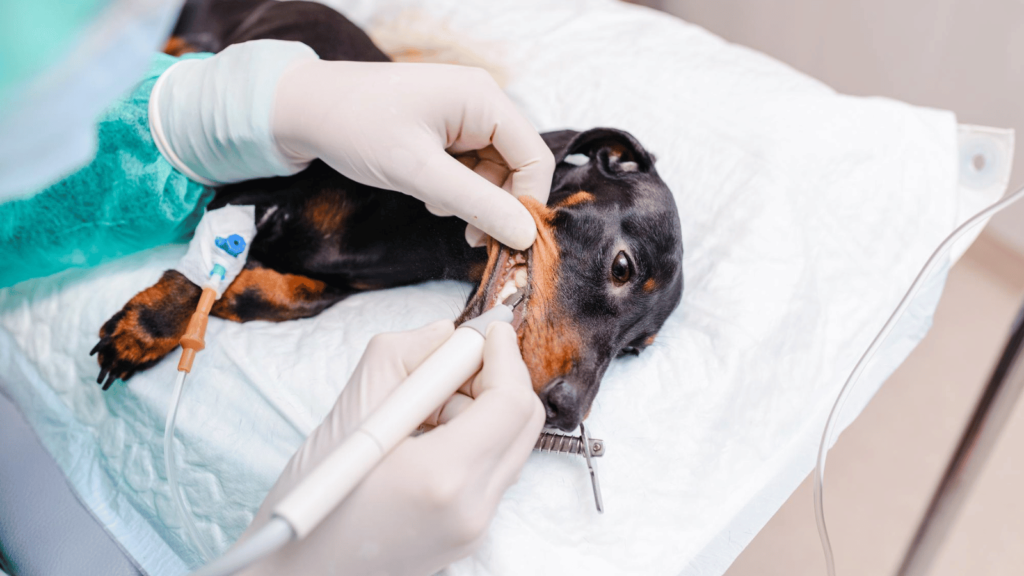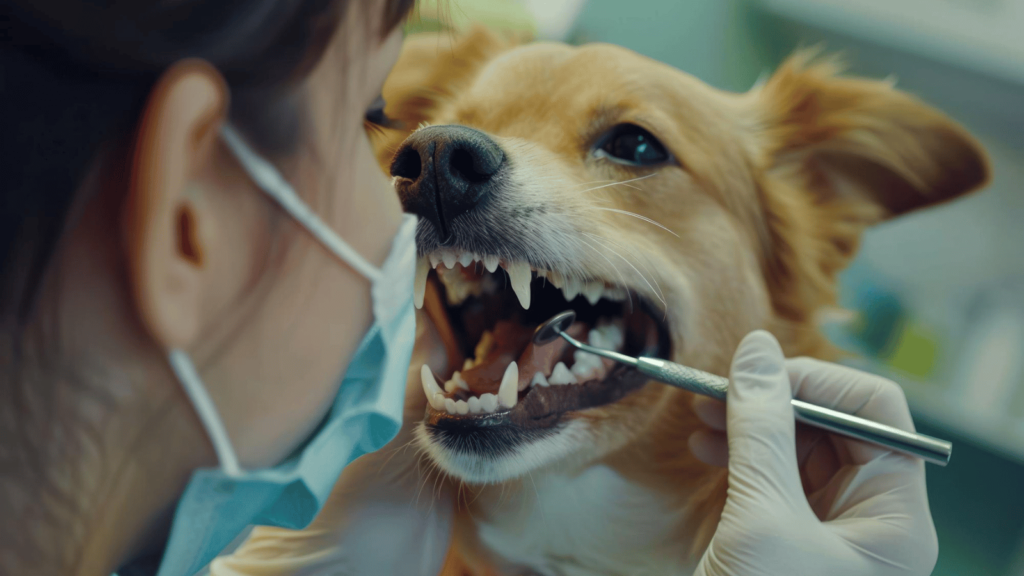When was the last time you checked your pet’s teeth? Pets need regular dental care. It keeps not only their pearly whites but also their health and happiness. Yet, dental hygiene is often one of the most overlooked aspects of pet care.
Use our “Pet Dental Solutions” guide to learn more about dental care for pets. Neglecting it can cause more than bad breath. It can trigger a cascade of health issues. These issues hurt your furry friend’s quality of life and longevity.
In our Pet Dental Solutions guide, we’ll delve into the critical role dental health plays in your pet’s well-being. You’ll learn to spot dental diseases early. You’ll also learn about the big impact that good oral hygiene can have on physical health.
We’ll give you the knowledge and tools you need. Let’s explore how basic dental care for pets can boost their health and joy. It will help them lead a happier, more active life by your side.
Understanding Pet Dental Health
When talking about a healthy pet, vibrant energy, shiny fur, and bright eyes often come to mind. But what about their teeth? Dental health is a pivotal yet underestimated aspect of your pet’s well-being. A healthy mouth isn’t about a sparkling smile; it’s connected to the entire health system.
What is dental health in pets?
Dental health in pets encompasses everything from strong, plaque-free teeth to healthy gums. Just like in humans, the mouth can serve as a window to overall health in animals.
It involves preventing, diagnosing, and treating conditions in the mouth. This keeps your pet free from pain, infection, and diseases that can spread. You can look for affordable pet dental care if you’re on a budget.
Common Dental Diseases in Pets
Pets are prone to a variety of dental issues, some of which mirror human problems.
Periodontal Disease: This is the most common dental condition in dogs and cats. It starts with a plaque on the teeth. Then, it becomes tartar and gingivitis. If left untreated, it can cause you to lose your pet’s teeth and bones.
Gingivitis is gum inflammation. It often comes before serious gum diseases. Red, swollen gums that bleed are clear indicators of gingivitis.
Tooth decay and abscesses are less common in pets than in humans. However, pets can suffer from cavities and severe infections. These can lead to painful abscesses and systemic infections. Hence, heeding to the pet dental solutions is a much better option than seeing your furry pet suffer.
Signs and Symptoms to Watch for suggested by our “Pet Dental Solutions”:
Early detection is key to managing and preventing dental diseases in pets. Here are some signs from our “Pet Dental Solutions” that could indicate it’s suffering from dental health issues.
- Bad breath—more than “dog breath,” persistent foul odors can indicate underlying problems.
- Difficulty eating or changes in eating habits? Watch if they’ve preferred softer food or chew only on one side.
- Visible tartar and plaque are on the teeth.
- Swollen or bleeding gums.
- Frequent pawing at the mouth or drooling.
Understanding these basics of pet dental health empowers you. It helps you as a pet owner to take proactive steps to care for your furry friend’s teeth. Remember, good oral hygiene isn’t just about avoiding bad breath.
It’s about setting the foundation for a healthy, vibrant life. By doing regular dental care for pets, you ensure that your pet stays happy and healthy. It helps them remain part of your family for many years.
Credit: https://www.freepik.com
Consequences of neglected dental care
Many pet owners are diligent about their furry friend’s diet and exercise. But they may not realize that dental health for pets is just as important. Ignoring your pet’s dental care isn’t about risking tooth loss. It’s about opening the door to severe health problems. These problems can impact their quality of life and how long they live.
Immediate Troubles: Pain and Discomfort
The most immediate consequence of neglected dental care is discomfort. Imagine the pain and irritation of a toothache. Pets feel it too. The pain can cause serious behavior changes. These include a loss of appetite.
They also include irritability and less interest in play or interaction. These changes can be heartbreaking to see. Going to the pet dental center when you see these issues is a must if you want your pet to be happy.
Systemic Health Issues: From Mouth to Body
When dental health is overlooked, the risks extend beyond the mouth. Our “Pet Dental Solutions” shows you all the risks below:
Infections: Bacteria from gum disease can enter the bloodstream. They do this through inflamed gums and spread to vital organs such as the heart, liver, and kidneys. This can lead to infections. They’re much harder and costlier to treat than dental disease alone.
Heart disease: There is a well-documented link between oral health and heart disease in pets. It causes heart disease. Mouth bacteria can affect the heart. They’ve caused endocarditis, an inflammation of the heart’s inner layer.
Diabetes: Diabetes and the immune system are impacted in pets with chronic dental infections. The infections activate the immune system. This can make it harder to manage other conditions, such as diabetes. Therefore, when you get the earliest signs of dental discomfort in your pets, do take them to the pet dental center.
A slow creep: the progression of dental diseases.
Without regular dental care for pets, mild conditions like gingivitis can become periodontal diseases. It can cause tooth loss and bone degeneration. This progression makes the pet’s pain and health issues worse.
It also raises the financial cost for owners. Hence, if you want affordable pet dental care, take them to the pet dental center regularly to avoid a serious disease diagnosis.
Anecdotal evidence: it’s the silent suffering.
Veterinarians often share stories of pets with severe dental issues. The owners didn’t notice because pets are good at hiding pain. A classic example involves a dog. It had been less active and more irritable for several months.
After a thorough dental exam, the dog got treatment for many dental abscesses. Afterward, it’s mood and activity greatly improved. This showed how much it had suffered.
The Takeaway
Neglected dental care in pets has serious results. They show the need for a proactive approach to dental hygiene. The check-ups and cleanings don’t maintain your pet’s smile.
They also stop many avoidable health issues. By focusing on dental care for pets, you’re not just investing in your pet’s oral health. You’re also securing their health. You’re ensuring they stay joyful and pain-free for years to come, also resulting in affordable pet dental care.
Credit: https://www.freepik.com
Preventive Measures and Daily Dental Care
Every pet owner dreams of a long, happy life for their furry companion. One of the most effective ways to ensure this is through proactive dental care for pets. Taking preventive steps, for instance, taking them to the pet dental center regularly, cuts the risk of dental diseases.
They are painful and expensive to treat. Here’s how you can add good dental hygiene to your daily routine recommended by our “Pet Dental Solutions.” It will keep your pet healthy and their tail wagging.
The Basics of Daily Dental Care
- Brushing Teeth: Like humans, pets benefit from regular tooth brushing. This is a form of cheap pet dental cleaning. Daily brushing is ideal, but if that’s not feasible, aim for at least three to four times a week.
Use a toothbrush made for pets. Also, use toothpaste safe for animals. Human toothpaste can be toxic to pets. Start slowly. Let your pet get used to the sensation. Then, gradually build up to a full brushing routine.
- Chews and toys: Dental chews and toys can help reduce plaque buildup in your pet’s life. Add them to your pet’s routine. This is also a cheap pet dental cleaning. These products are designed to be fun and useful.
They provide abrasion that cleans teeth. However, it’s important to pick chews that are the right size. This is to avoid choking hazards and ensure they work for your pet’s dental needs.
- Crunchy foods: Feeding your pet a diet that supports dental health is also a critical part of pet dental solutions. Some pet foods reduce plaque and tartar. Crunchy foods can also help clean teeth. Consult with your veterinarian to choose the best food option for your pet’s oral and overall health.
Regular veterinary check-ups
- Annual Dental Exams: Make dental exams in a pet dental center a part of your pet’s regular veterinary check-ups. Your vet can spot early signs of dental issues. They can also provide professional cleanings or cheap pet dental cleaning if needed. These cleanings are more thorough than what you can do at home. It’s crucial for preventing gum disease.
- professional cleanings: Your vet may recommend professional cleanings. Affordable pet dental care depends on your pet’s dental health. They often include scaling and polishing under anesthesia. This allows for a deep clean of both the visible parts of the teeth and below the gum line.
Educational Resources and Regular Awareness
Stay informed about the latest in pet dental health. Do this by consulting resources from veterinary and pet health groups. You can also get pet dental solutions and tricks at pet health workshops or webinars. They’re tailored to your pet’s needs.
The Impact of Preventive Care
The benefits of preventive dental care for pets go beyond avoiding bad breath. It extends your pet’s life. It improves their life quality and can prevent the pain from dental diseases. It also saves you from high vet bills. The bills are for dental issues that could have been prevented.
Embracing preventive care and pet dental solutions shows you are committed to your pet’s health. By spending a little time each day, you ensure that your pet stays vibrant, healthy, and active. Remember, a clean mouth supports pet dental health. It also helps their well-being.
Credit: https://www.freepik.com
Professional dental treatments for pets
When it comes to our pets, we often go the extra mile to ensure they’re happy and healthy. Regular brushing and preventive care at home are essential. But sometimes we need professional help at a pet dental center to keep our pet’s teeth healthy.
Professional dental treatments offer a deeper clean. They can prevent serious health issues and extend your pet’s life. Here’s what you need to know about these vital services in our “Pet Dental Solutions.”
The Essentials of Professional Dental Care
Professional dental care for pets is like for humans. It involves many steps that go beyond daily brushing, including:
- Oral Examinations: Every professional dental treatment begins with a thorough oral examination. Veterinarians look for signs of dental disease. These signs include gingivitis, periodontal disease, loose teeth, and tumors. It’s crucial. Many dental problems aren’t visible to the naked eye. They may not yet be causing your pet any discomfort.
- Dental Scaling and Polishing: Vets perform scaling and polishing. These are part of cheap pet dental cleaning. They do this, like dentists, for us. Scaling removes plaque and tartar above and below the gum line. This prevents the progression of periodontal disease. Polishing smooths the teeth. This helps slow new plaque and tartar.
- Dental X-rays: X-rays are a critical component of a pet dental exam. They allow vets to evaluate the health of the jaw and tooth roots below the gum line. Many dental issues are hidden. Without X-rays, these problems could go undiagnosed and untreated.
- Advanced treatments: Pets with severe dental issues might need advanced treatments. These treatments could include extractions, root canals, or even orthodontics. These procedures are essential for alleviating pain, removing infection sources, and restoring function.
Preparation and aftercare.
- Pre-treatment preparations are needed for professional dental treatments. They often require anesthesia, so pets need to fast overnight. Pre-anesthetic blood work is recommended to ensure the pet’s healthy enough for sedation.
- Post-Treatment Care: After a dental procedure, your pet may be groggy from the drugs. You must follow your vet’s home care recommendations. These may include feeding soft foods and giving it pain medication.
Why invest in professional dental care?
Investing in professional dental care for your pet is investing in their long life and joy. This is one of the biggest pet dental solutions. Dental disease can cause major health problems. So, fixing dental issues not only helps your pet’s mouth but also their overall health.
- Preventative Savings: Professional dental care is costly. But it is small compared to treating advanced dental diseases; hence, it’s also a form of affordable pet dental care. These can arise from poor oral health and affect the whole body.
- Quality of Life: A pet free from dental pain is a happier, more active pet. Professional dental care ensures your pet can continue to eat, play, and interact .
Professional dental treatments aren’t just extras. They are essential parts of complete pet care. Regular professional cleanings, exams, and advanced treatments keep your pet healthy.
As a pet owner, being proactive about dental care means less pain. It also means fewer problems and more joyful years with your beloved pet.
Credit: https://www.freepik.com
The Economic Impact of Pet Dental Care
Good dental health is key for your pet. Pet dental solutions also affect your finances as a pet owner. Understanding the economic effects of dental care is important. This includes both prevention and correction.
It can help you make informed choices. These choices will keep your pet healthy and manage your budget well. Here’s how smart dental care can be a wise investment in your pet’s future and your financial peace of mind, according to our “Pet Dental Solutions”:
Costs of Neglect: The Price of Inaction
The old adage “an ounce of prevention is worth a pound of cure” holds particularly true in pet dental care. Neglecting your pet’s teeth can lead to many painful problems. They’re complex, and treating them is expensive. Here’s what you might face financially if dental issues aren’t addressed early:
- Severe periodontal disease, tooth extractions, and oral surgeries need professional veterinary care. But it can be costly. For example, the treatment for a single tooth extraction can cost hundreds of dollars. More complex procedures could cost even more.
- Dental problems can lead to body issues. These include heart, liver, and kidney diseases. They’re dangerous for your pet and cost more to treat than dental issues.
Preventive Care: A Cost-Effective Strategy
Regular dental checkups and cleanings might seem unnecessary at first. But preventing them is far cheaper; that’s why it’s called affordable pet dental care. Treating them costs more.
- Regular check-ups and cleanings vary in cost. They involve an initial outlay. But they can prevent larger future health costs.
- Home Care Savings: Brushing daily and using dental products can reduce dental issues. This cuts the need for costly treatments.
Insurance and pet dental care.
Pet health insurance can reduce the cost of both routine and emergency dental care. Many pet insurance plans cover comprehensive dental treatments. This includes cleanings, X-rays, and surgeries.
Understanding and choosing the right insurance plan can help manage the costs. The costs are those associated with maintaining your pet’s dental health.
Pet Health Insurance covers dental care. By buying it, you can lower out-of-pocket costs. This ensures your pet gets treatment without financial strain.
Long-term benefits and cost savings according to “Pet Dental Solutions”:
Keeping your pet’s teeth healthy saves you money. It avoids costly treatments and adds to their long and happy life. Healthy pets are happier. They often need fewer vet visits for illness or injury. This leads to long-term savings.
Dental care’s economic impact on pets is significant. It affects both immediate and long-term planning for pet owners. By focusing on dental health with preventive measures. Also, by considering insurance options.
You can protect both your pet’s health and your wallet. In the end, the investment in dental care enriches and lengthens your pet’s life. It also reduces financial surprises for you.
Real-life Success Stories
Every pet has a story. These stories show the benefits of careful dental care. They can be heartwarming and enlightening. Real-life accounts from pet owners follow. They show the critical importance of regular dental care. They also show it’s huge impact on the health and happiness of their beloved animals.
Case Study 1: Max’s Transformation
Max was a spirited Golden Retriever. He had always been the life of the party. But, his owner, Sarah, noticed that he was playing less and seemed tired. His breath had become noticeably foul, and he was reluctant to eat his usual kibble.
After a visit to the veterinarian, Max was diagnosed with advanced periodontal disease. He underwent a comprehensive dental cleaning and had several teeth extracted. The change post-treatment was night and day.
Within weeks, Max was back to his playful self, his appetite returned, and his breath was no longer an issue. Sarah noted, “It was like getting my young, energetic dog back. I didn’t realize how much pain he was in until I saw how he was after the treatment.”
Case Study 2: Bella’s Quiet Suffering
Bella, a shy Siamese cat, was notorious for being a picky eater. However, her owner, David, began to worry. Bella started to lose weight and groom herself less. A detailed dental exam revealed many tooth resorptions.
This is a painful condition common in cats. But, it is hard to detect without professional help. After receiving the necessary dental surgeries, Bella’s demeanor improved remarkably. She started eating with gusto and was more active and affectionate.
David was relieved, saying, “I wish I had known earlier. Seeing her thrive now, I realize the importance of regular dental check-ups.”
Case Study 3: Cooper’s Close Call
Cooper, a robust German Shepherd, started drooling excessively and bleeding from his mouth. His owner, Jessica, rushed him to the vet, fearing the worst. Cooper had a big abscess on one of his back teeth.
It was treated with antibiotics. The dentist then removed the tooth. After recovering, Cooper’s energy levels soared. His interactions with family increased a lot. Jessica reflects, “The scare taught us a lot about pet health. We now have a dental care routine that’s as strict as our own. It’s given Cooper a new lease on life.”
These stories underscore a simple truth. Regular dental care is vital for a pet’s health and well-being. Each pet had a big quality-of-life improvement after dental treatment. This shows how much dental care can help.
These success stories serve as a powerful reminder for pet owners. They show the importance of being proactive about dental health. They save our pets from pain. They also bring back the unique and cherished spirit that makes each pet special.
Conclusion
We’ve seen this through real-life stories and expert insights. Dental care is vital for our pets’ health and happiness. Dental health is not just about avoiding bad breath. It’s about preventing many health issues. These issues can detract from the quality of life our pets enjoy and deserve.
According to our Pet Dental Solutions Guide, taking action on dental care is not a duty; it’s an act of love. You need to make sure your pet gets regular dental check-ups. They should stick to a daily dental care routine.
They should get professional treatments. when needed. These steps can transform their well-being. It’s about more than clean teeth—it’s about enabling your pet to live a fuller, more joyful life.
Remember, every tail wag and every purr starts with health. And, health often starts with good dental care. Let’s keep our pets smiling bright, happy, and healthy. After all, their smiles are some of the most heartwarming rewards we’ve ever hoped to receive.
So, grab that toothbrush. Schedule that vet visit. Commit to dental care. It could very well save your pet’s life. Here’s to many more years of healthy smiles and wagging tails!

